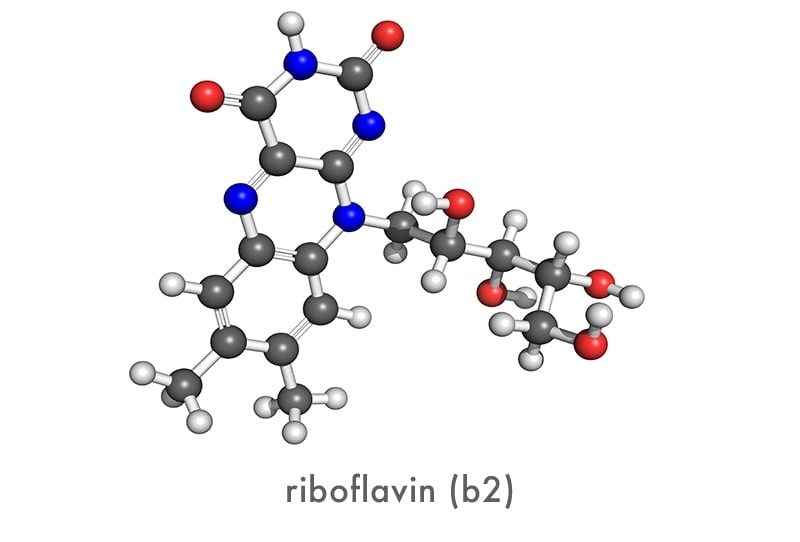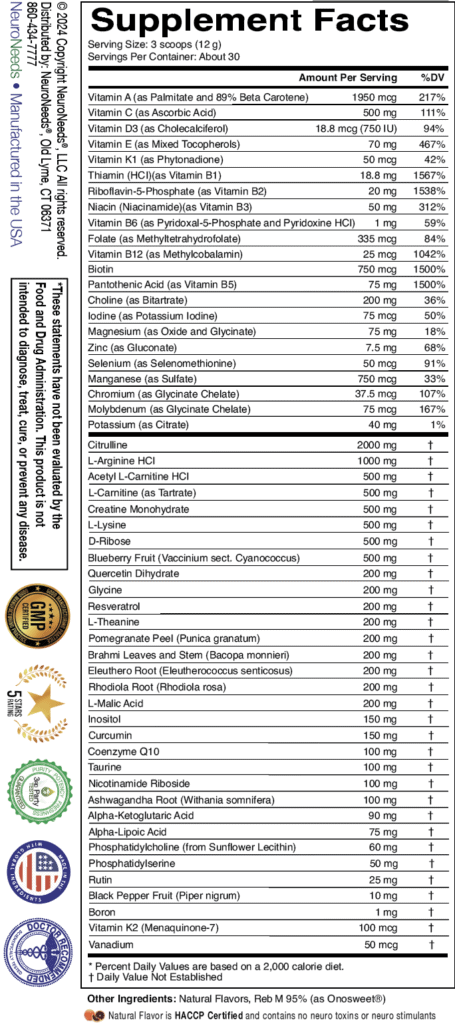$84
Riboflavin
Riboflavin cannot be manufactured by humans and is obtained exclusively from the diet. Riboflavin is an enzyme cofactor in a wide range of enzymes in the electron transport chain, fatty acid metabolism, Krebs cycle, branched-chain amino acid catabolism, glutathione pathway, and the activation of many other vitamins and minerals. Riboflavin deficiency is rare today outside of cases of extreme malnutrition, people with poor diets consisting mostly of white polished grains, or with chronic diarrhea. Signs and symptoms usually involve the blood (anemia) and skin (painful, fissured rashes, including in the mouth). While, riboflavin is present in a wide variety of foods, it is supplemented in individuals with mitochondrial dysfunction (or those desiring more mitochondrial function) mostly in order to provide high levels that serve to force riboflavin-containing enzymes to increase their activity. Very high-doses of riboflavin are often recommended in the prevention of migraine. Riboflavin is also important for eye health, and may lower the risk of developing cataracts. Due to its role in the maturation of vitamins, taking riboflavin can also reduce homocysteine levels in the blood. While studies are few, the clinical experience of many physicians, and the generally benign nature of riboflavin supplementation have convinced some experts to offer riboflavin supplementation to many of their patients. Riboflavin is water-soluble and non-toxic even at high doses. Because of the potential for nausea at very-high dosing, supplementation of riboflavin in ActivNeeds is only moderate (20 mg). However, riboflavin is present in ActivNeeds in its active form, riboflavin-5-phosphate, which has better bioavailability than straight riboflavin. Individuals with substantial migraine or other specific riboflavin-responsive conditions may want to discuss adding additional supplementation with their physician.
Riboflavin in ActivNeeds

Riboflavin is present in ActivNeeds® in its active, highly-bioavailable form of riboflavin-5-phosphate in order to provide a wide basis of nutrition, especially given its important role in energy metabolism.
Riboflavin, also known as vitamin B2, is one of the eight B-complex vitamins. Riboflavin cannot be manufactured by humans and is thus a true vitamin, obtained exclusively from the diet.
Riboflavin is an enzyme cofactor, which means that it is a necessary component for enzyme function. Riboflavin is a cofactor in a wide range of enzymes, including enzymes in the electron transport chain, fatty acid metabolism, Krebs cycle, branched-chain amino acid catabolism, and glutathione antioxidant pathway. In addition, riboflavin is required for the activation of many other vitamins and minerals, including vitamins A, niacin, pyridoxine, folate, and iron. Many, but not all, of these roles are in energy production.
Riboflavin deficiency is generally found today in cases of extreme malnutrition. Outside of that context, riboflavin deficiency can be found in people whose diet consists mostly of white polished grains (not whole grains), or with substantial GI malabsorption such as chronic diarrhea. Signs and symptoms usually involve the blood (anemia) and skin (painful, fissured rashes, including in the mouth).
Riboflavin is supplemented in individuals with mitochondrial disease or dysfunction mostly in order to provide extraordinary levels that serve to force riboflavin-containing enzymes to increase their activity. The Recommended Daily Allowance (RDA) for riboflavin is about 1 mg, but doses from 25 to 200 mg are generally used in disorders of energy metabolism. Those suffering from migraines may find that taking riboflavin may help. Per a recent review (https://www.ncbi.nlm.nih.gov/pubmed/28485121) a “total of 11 clinical trials reveal a mixed effect of riboflavin in the prophylaxis of migraine headache. Five clinical trials show a consistent positive therapeutic effect in adults; four clinical trials show a mixed effect in paediatric and adolescent patients, and two clinical trials of combination therapy have not shown benefit.” Studies often use 400 mg of riboflavin a day for migraine prevention, but lower doses may be appropriate for pre-adolescents and people sensitive to developing nausea. In addition to migraine, riboflavin is often supplemented in other conditions associated with mitochondrial dysfunction. Riboflavin is also important for eye health, in part as this vitamin is needed to protect glutathione, which is an important antioxidant in the eye. The U.S. National Library of Medicine (NLM) reports that eating a diet rich in riboflavin can lower the risk of developing cataracts. Due to its role in the maturation of vitamins, taking riboflavin can also reduce homocysteine levels in the blood by 26 to 40 percent, according to the NLM.
Most supplements contain riboflavin, but some sources suggest that the activated (riboflavin-5-phosphate, R5P) form is better. Riboflavin needs to be converted by the body to R5P, and providing R5P in ActivNeeds bypasses this step, improving absorption (bioavailability).
While any supplement taken into the stomach can cause nausea, riboflavin is well known for this. Thus, medical care providers often recommend a lower dose at first, which is increased over time. However, riboflavin is water-soluble and excessive amounts are excreted by the kidneys, so toxicity is unlikely. A dose of 400 mg a day has been recommended for the treatment of migraine, and causes no known toxicity. Per a review article regarding 11 trials of high-dose riboflavin for migraine, “adverse reactions with riboflavin have generally been mild” (https://www.ncbi.nlm.nih.gov/pubmed/28485121). Riboflavin can also make the yellow glow a bright yellow color, and the urine has a characteristic odor.
Laboratory testing can reveal the presence of a deficiency of this nutrient, but is generally not likely to have clinically utility.
Therapeutic dosages of riboflavin in migraineous conditions typically are up to 400 mg a day, yet ActivNeeds contains only 20 mg. Thus, you may wish to speak to your health care provider regarding additional riboflavin supplementation beyond ActivNeeds if you have migraine or one of the conditions for which very-high-dose riboflavin supplementation is often recommended.
How and Why is Riboflavin Used in ActivNeeds
Riboflavin is added to ActivNeeds in order to provide high levels of riboflavin, which serve to force riboflavin-containing enzymes throughout energy metabolism to increase their activity. Although studies are few, clinical experience and the generally benign nature of riboflavin supplementation have convinced some expert physicians to provide this nutrient to their patients with a variety of conditions related to mitochondrial dysfunction. The possibly that high-dose riboflavin supplementation might lead to nausea prompted the relatively moderate dose (20 mg per day) in ActivNeeds. However, riboflavin is present in ActivNeeds in its active and highly bioavailable form, riboflavin-5-phosphate.
Order ActivNeeds Today
Formulations










